Magento 2 Backend Exploration: SEO & Search

Below, we continue our exploration of the Marketing area situated in the Magento 2 backend. The following article sheds light on the SEO & Search section, which includes the following screens: URL Rewrites, Search Terms, Search Synonyms, and Site Map. Below, we show how to work with each one. You will find out how to add new URL rewrites, search terms/synonyms, and site maps. Besides, the article describes how to import/export all the related data.

Table of contents
Magento 2 SEO & Search
Below, we describe the following four screens as well as the related opportunities they provide:
- URL Rewrites;
- Search Terms;
- Search Synonyms;
- Site Map.
You can find them under Marketing -> SEO & Search.
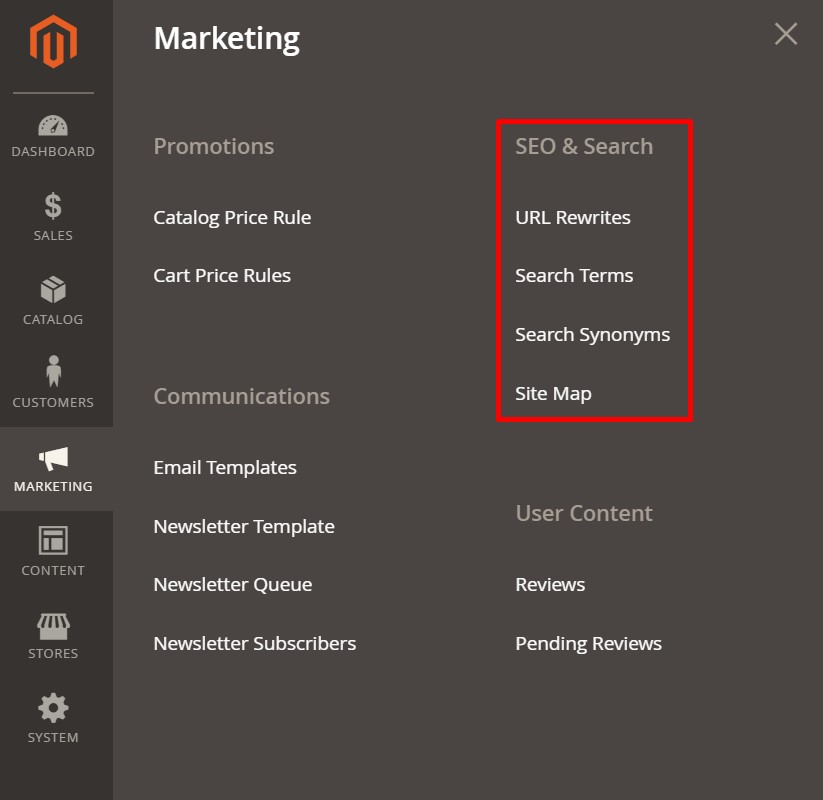
URL Rewrites
With URL Rewrites, you can change any URL associates with your store pages: product, category, CMS, etc. After the change is applied, any links that point to the primary address are redirected to the new one. You can find more information about URL rewrites here: . Now, let’s see how everything works in the Magento 2 admin.
The URL Rewrites grid doesn’t have any common control elements available on other Magento 2 screens. However, filters and search are built into each column:
- ID – an ID number of your Magento 2 URL rewrite;
- Store View – a corresponding store view;
- Request Path – a new URL address;
- Target Path – an original URL address which is replaced;
- Redirect Type – No, Temporary (302), or Permanent (301);
- Action – edit your URL rewrites here.
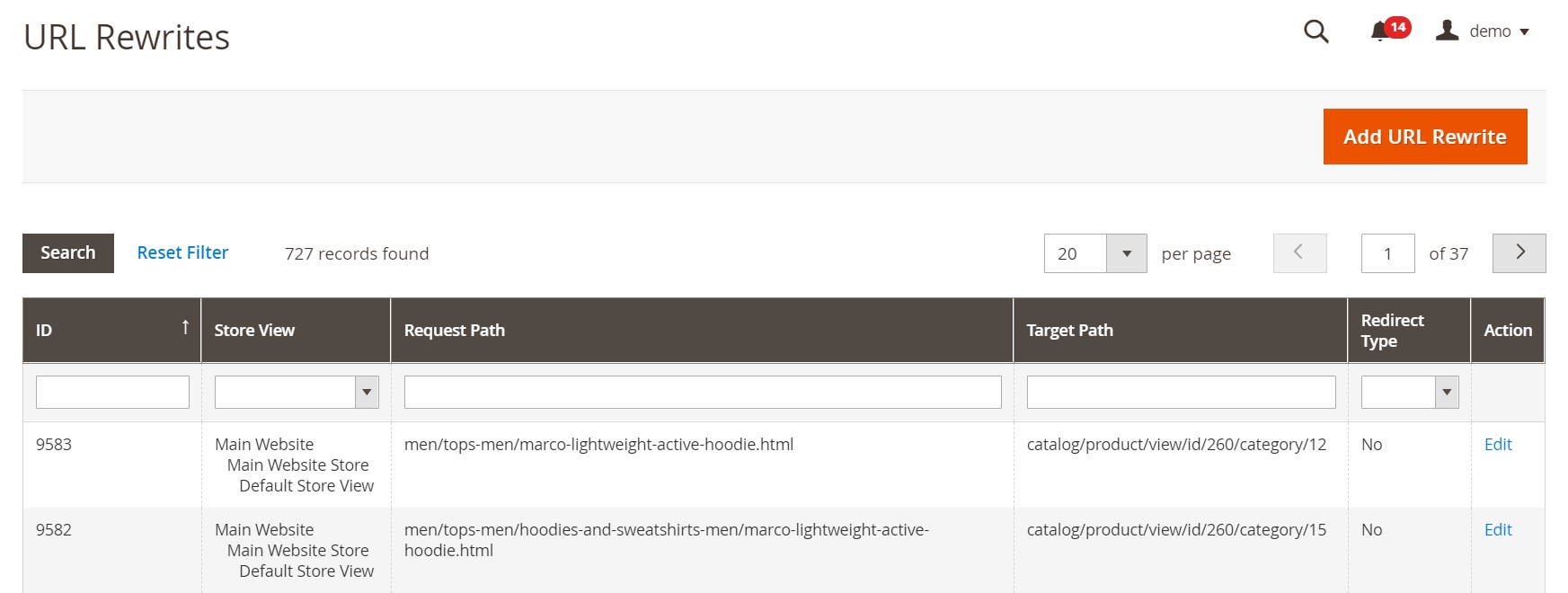
How to edit URL rewrites in Magento 2
To edit an existing URL rewrite in Magento 2, hit the appropriate link from the Action column mentioned above. You will be redirected to a page where you can change an associated store view, request path, and redirect type. It is also possible to add a description here. Don’t forget to save your URL rewrite after applying changes.
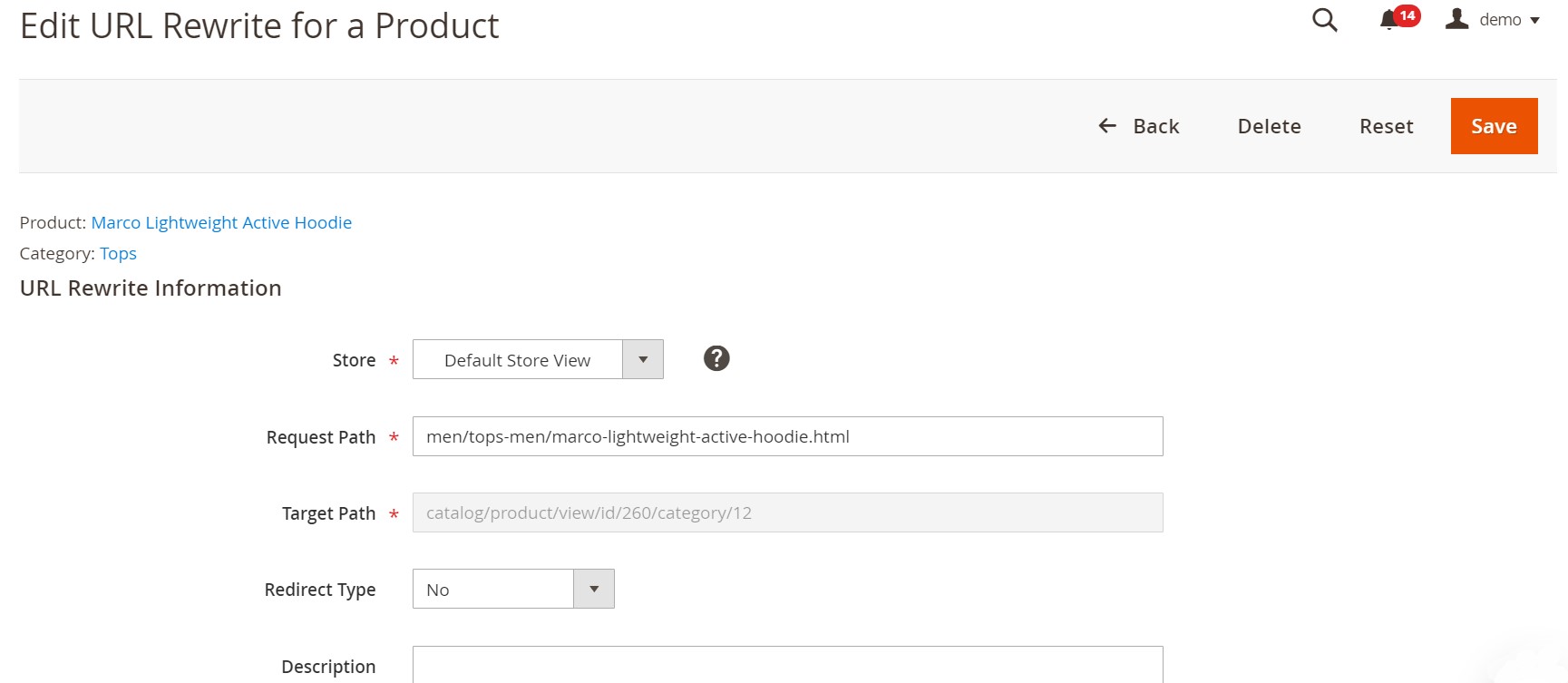
How to add a new URL Rewrite in Magento 2
On the URL Rewrites screen, hit Add URL Rewrite.
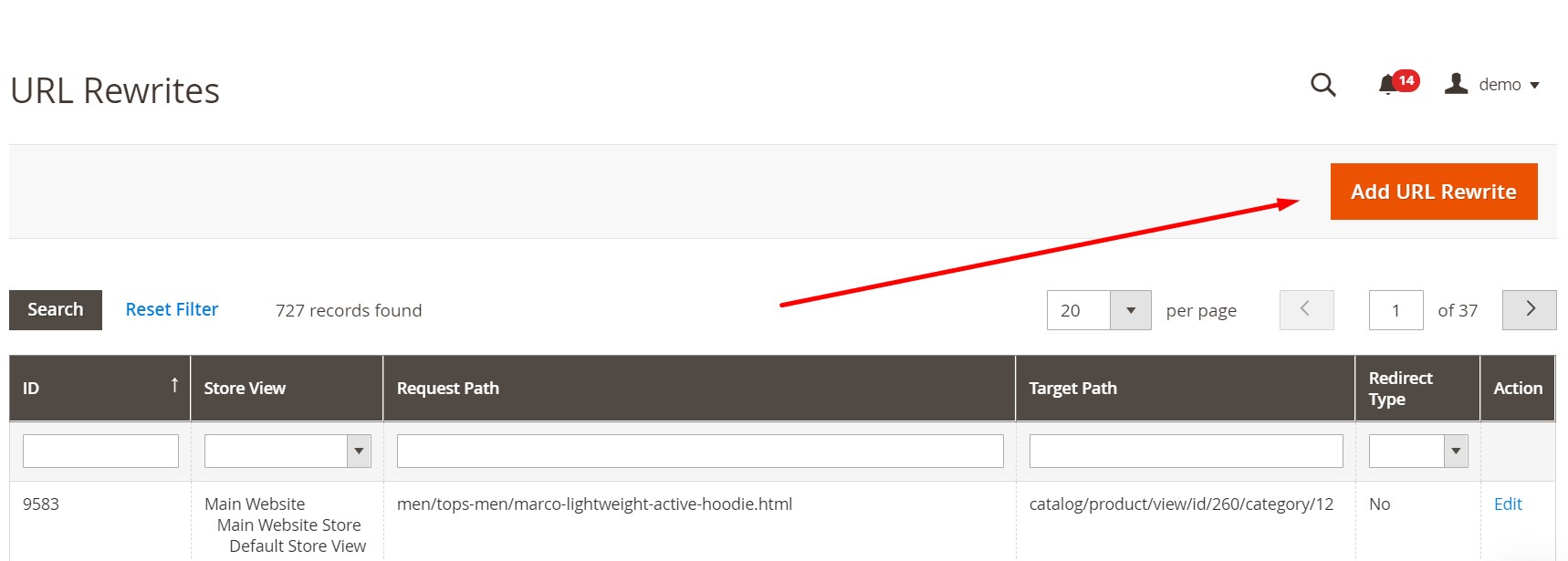
Now, you have to select a URL rewrite type from the Create URL Rewrite dropdown: Custom, For Product, For Category, For CMS page. Let’s create a new URL rewrite for a product page.
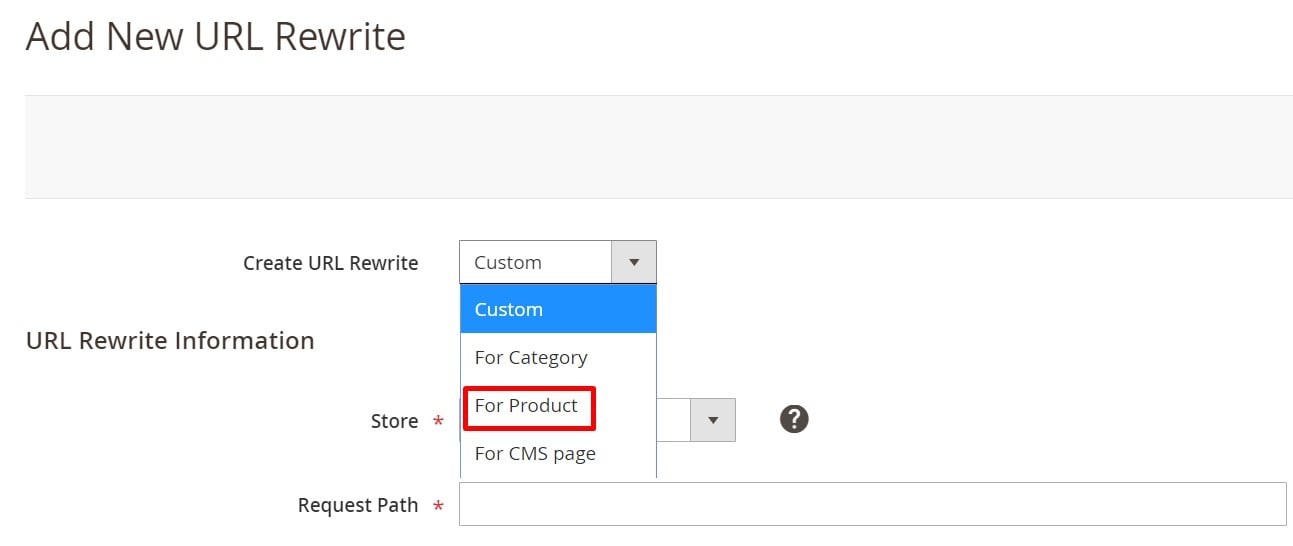 After selecting “For Product,” you will be redirected to a new screen. Choose a product to create a new URL rewrite.
After selecting “For Product,” you will be redirected to a new screen. Choose a product to create a new URL rewrite.
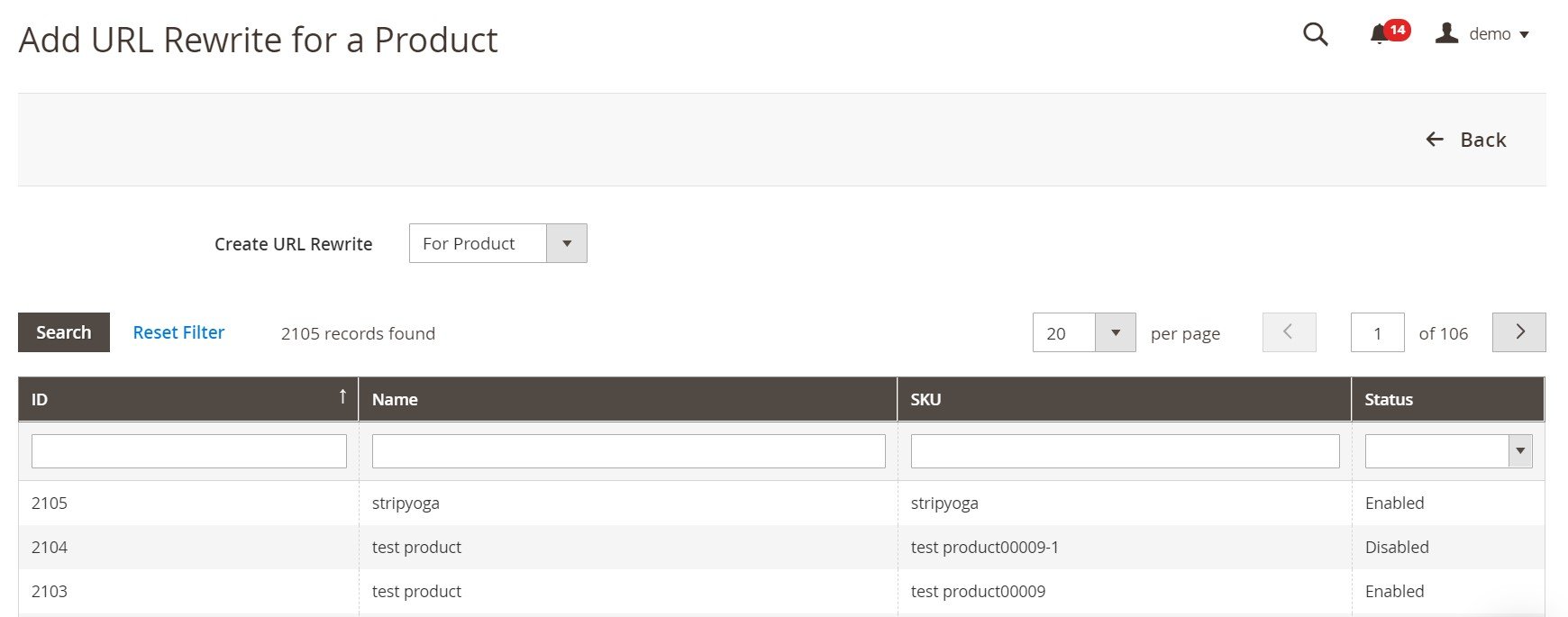
Now, you can add a category to your URL rewrite or skip its selection. If you don’t want to include a category, tap Skip Category Selection.
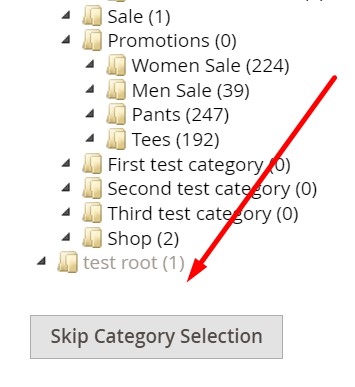
Now, you can choose a store view, edit a request path (type a new URL here), set a redirect type, and add a description. Don’t forget to save changes.
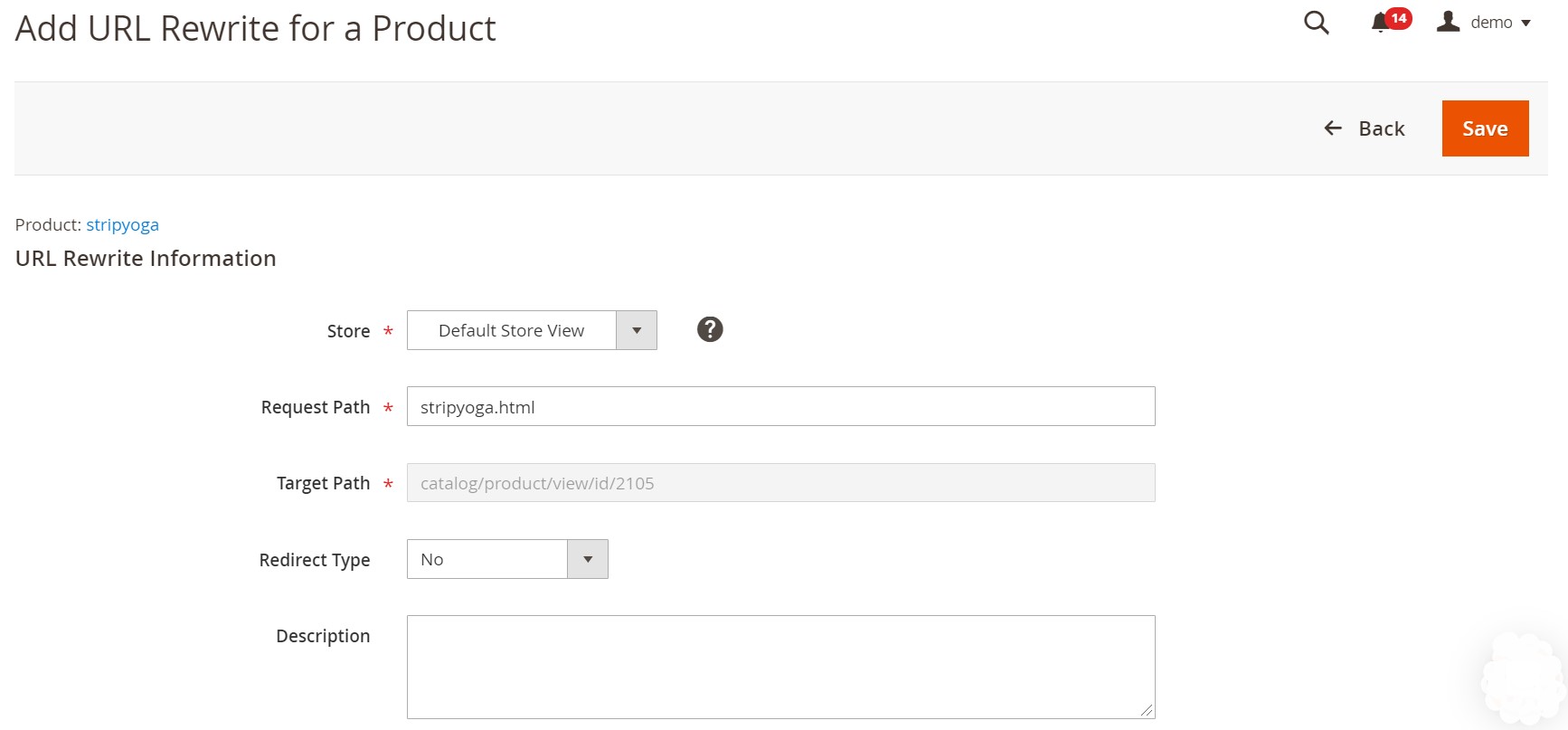
For further information, check this article: . It also describes rewrites for category and CMS pages as well as custom ones.
Search Terms
All search terms are available in a grid. You can delete them in bulk. As for filters, they are built into each column. The grid itself includes the following columns:
- Search Query – words and phrases used to find products on your website;
- Store – a store view where the query was used;
- Results – the number of results that match this query;
- Uses – the number of uses of this query;
- Redirect URL – a full URL to redirect the search results to another page in your store, or another website;
- Suggested Terms – the availability of this term in a suggestion whenever a search returns no results;
- Action – edit search terms here.
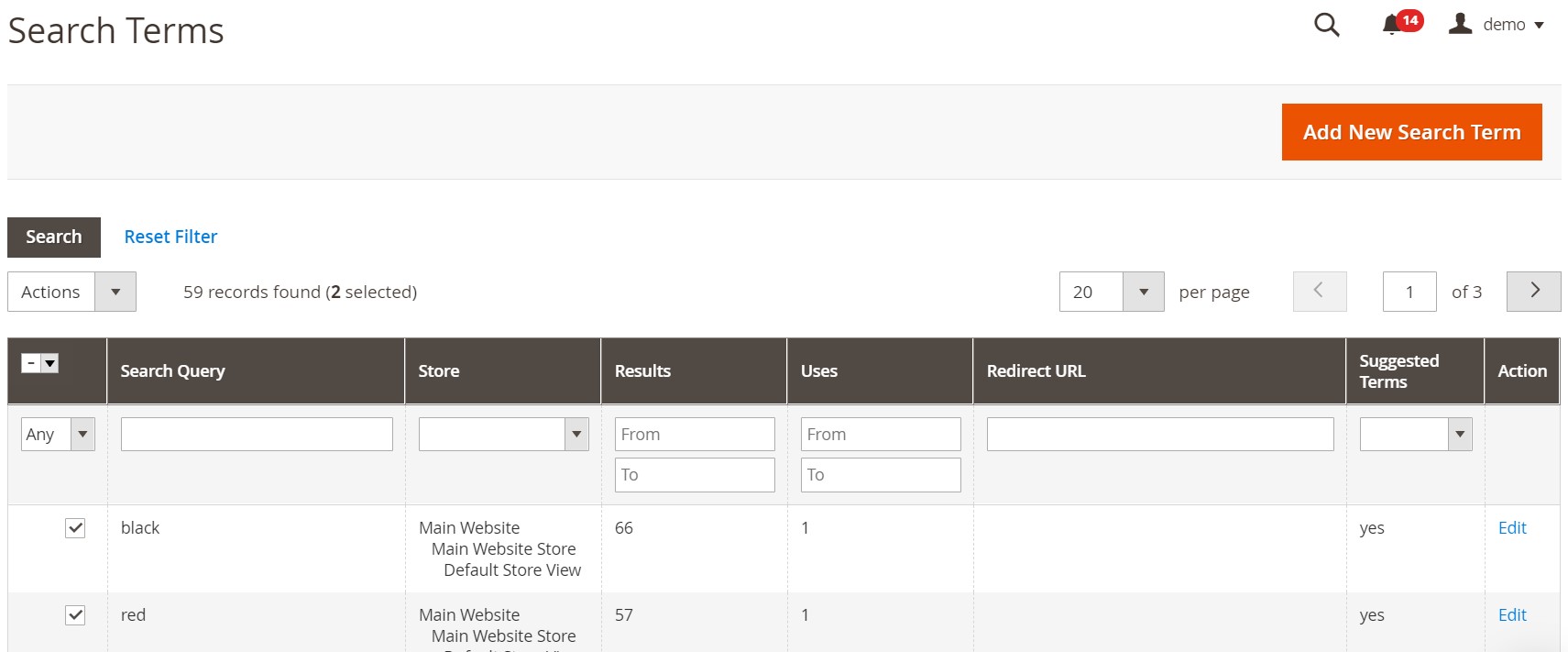
How to edit a search term in Magento 2
Hit the Edit link from the Action column to apply any changes to a search term in Magento 2. You will be redirected to a screen where Magento enables editing the existing search query text, choosing a store view, changing the number of results and uses, specifying a redirect URL, and enabling/disabling the display in suggested terms.
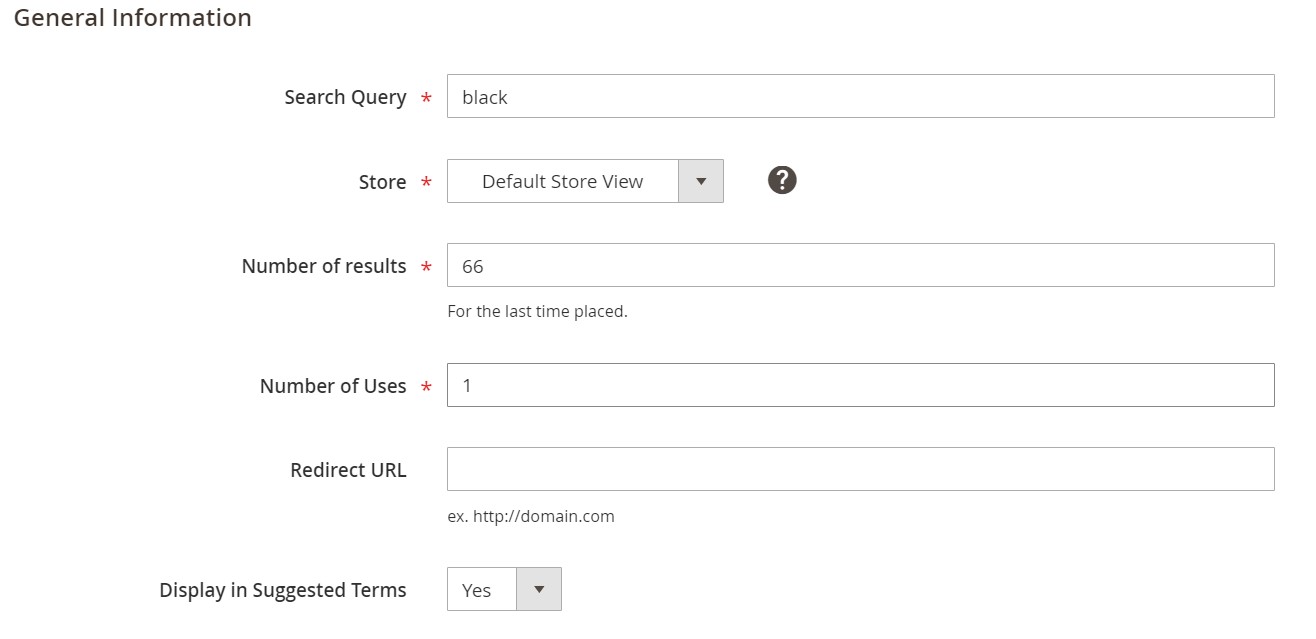
How to add a search term in Magento 2
To add a new search term in Magento 2, hit the appropriate button on the Search Terms screen:
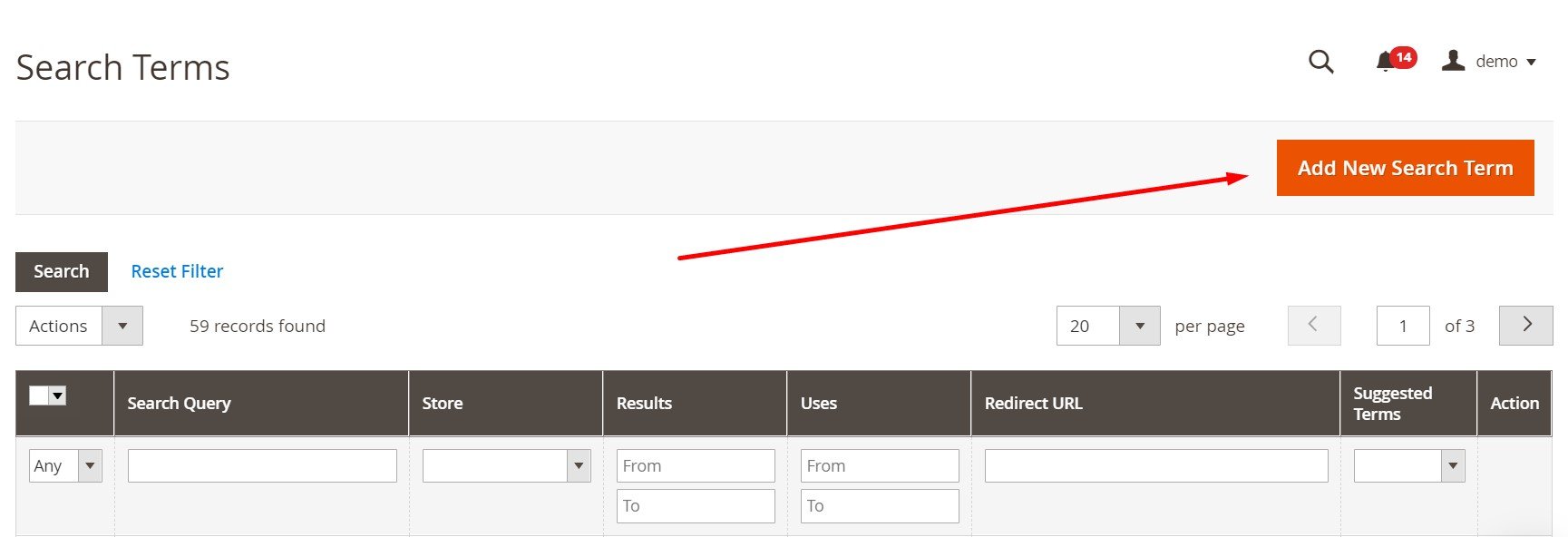
Now, specify the text of the search query, choose its store view, type a redirect URL if necessary, and decide whether to display it in suggested terms.

For further information, follow this link: .
Search Synonyms
The Search Synonyms screen looks quite common from the perspective of the default control elements. It contains a search field and a dropdown with actions (you can delete synonyms in bulk) on the left. At the same time, you can see a separate section with filters, view switcher, columns configuration, export, pagination, etc.
As for the grid, it displays such data as ID, synonym group, website, and store view. You can either delete or edit/view each group of synonyms from the Action column.
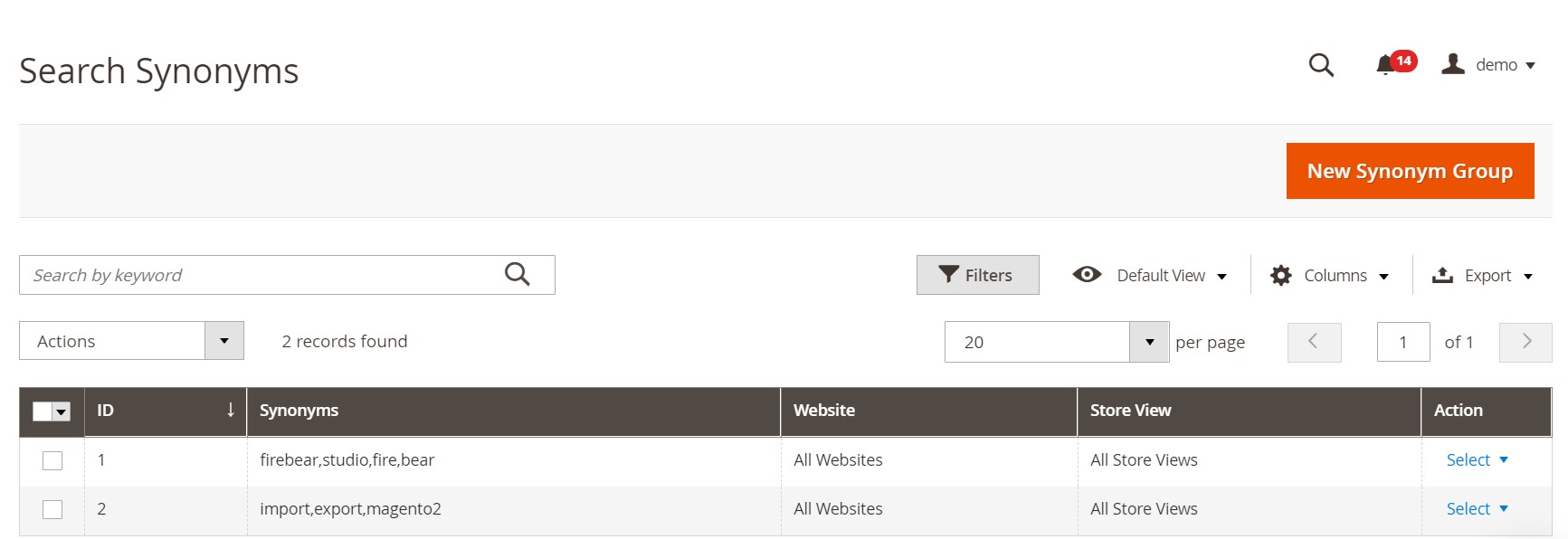
How to edit synonyms in Magento 2
Use the Action column to edit a group of synonyms in Magento 2. You can change its scope as well as add new words. There is also a checkbox below that lets you merge synonyms in groups that share the same scope. Check it to add one or more of the same terms to different synonym groups in the same scope and merge all the terms to one group.
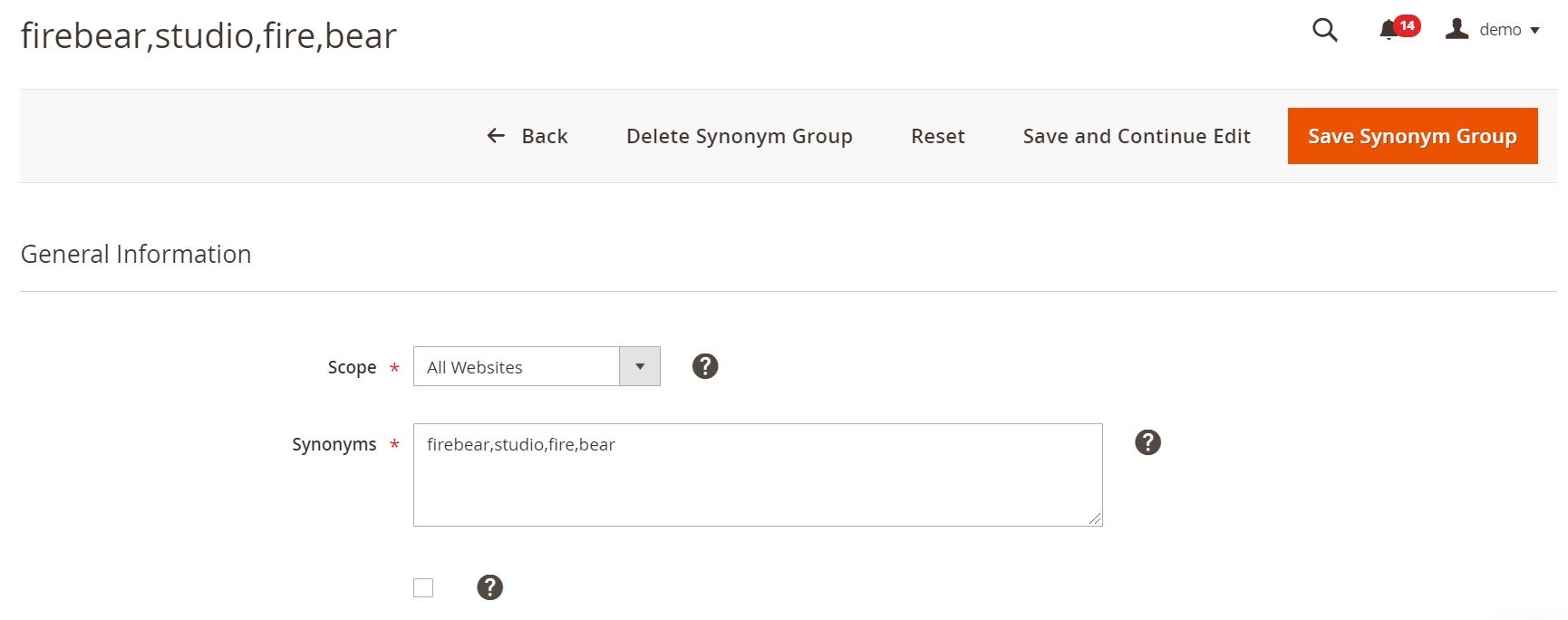
How to add a new synonym group
Hit the New Synonym Group button on the Search Synonyms screen to add a new group of synonyms. You will be redirected to a new screen that contains the three options we’ve just described.
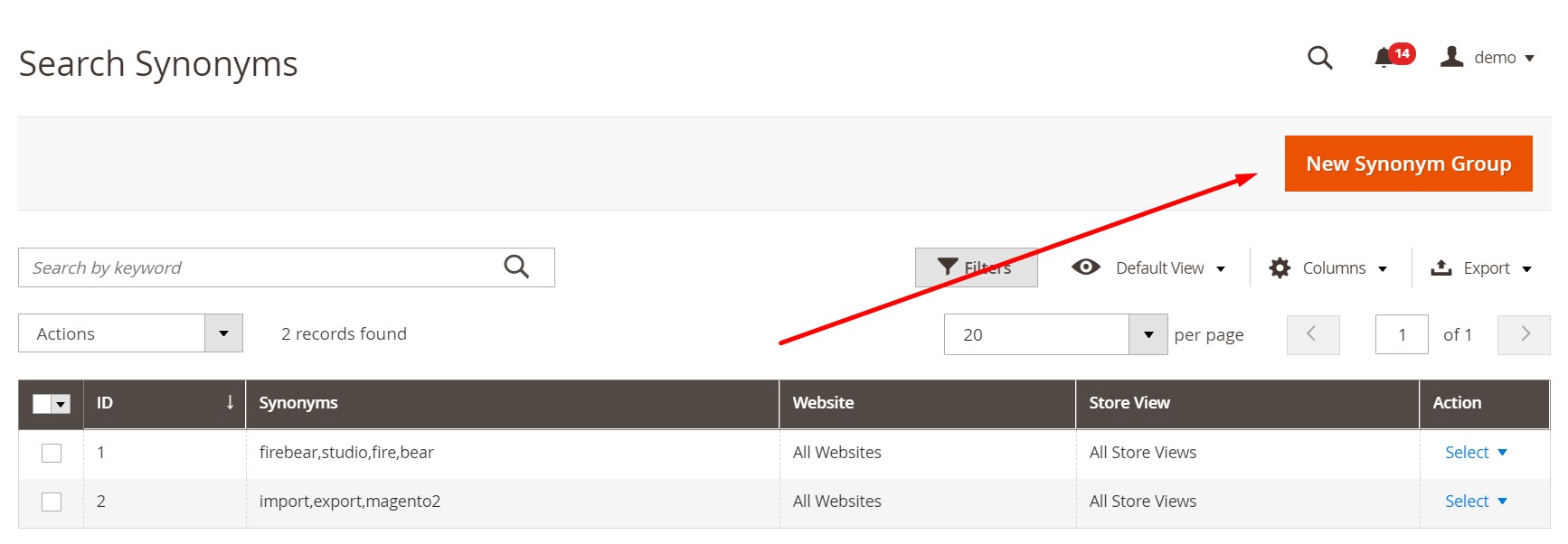
Site Map
All sitemaps are gathered in a grid under Marketing -> SEO & Search -> Site Map. The grid contains built-in filters so that you can easily find a necessary item. You can see a sitemap’s ID, filename, path, link for Google, last generation, and store view.

To generate a new sitemap, hit the Add Sitemap button. Specify its name and path on a new screen. Hit Save & Generate.

How to Import URL Rewrites, Search Terms, Search Synonyms to Magento 2
Use the Improved Import & Export extension to import URL rewrites, search terms, and search synonyms to Magento 2. You have to create three different jobs to transfer all the corresponding data to your e-commerce store quickly and automatically. Our module introduces the best opportunity to migrate from your old Magento 1 website or another e-commerce platform to a Magento 2 store and want to transfer the existing URL rewrites, search terms, and search synonyms. You only have to create an export file with the corresponding data on your old site and transfer it to a server or a Dropbox account. Next, create a new import profile, and Improved Import & Export will do everything for you. Follow these steps to prepare the tool for the URL rewrites, search terms, and search synonyms import:
Go to System->Improved Import/Export->Import Jobs and hit the “Add New Job” button.
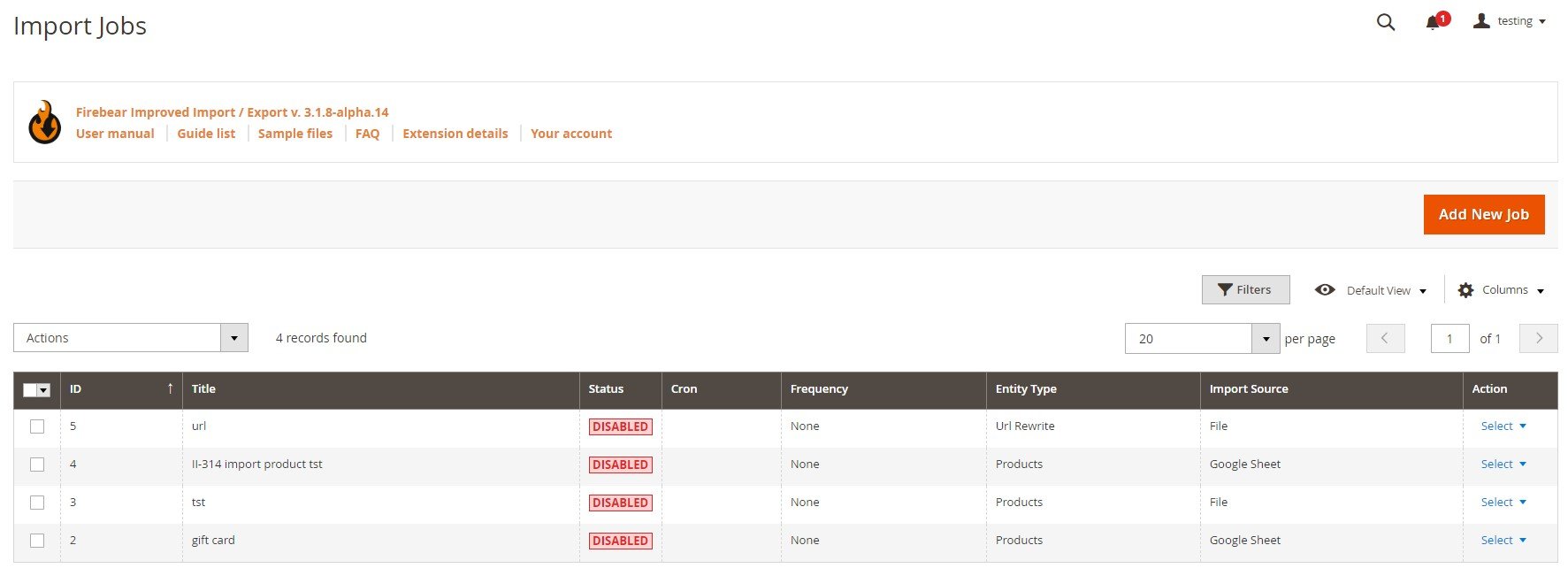
On the General Settings tab, enable the new job, type its title, and select the manual run frequency if you need more than one transfer. If you only need the one-time import, leave it empty. Next, choose a language (locale) and enable/disable unique URL generation, re-index, email notifications.
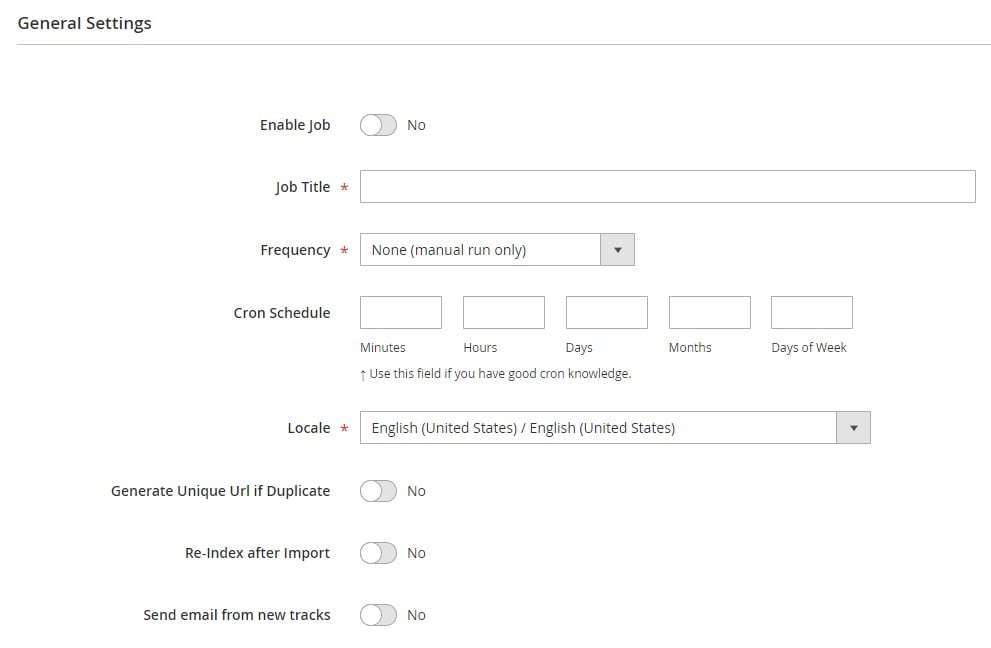
Now, you have to select URL rewrites, search terms, or search synonyms as your import entity on the Import Settings section. Do it after enabling/disabling API synchronization. Next, you can select a platform to import data from (Magento 1) to map attributes automatically. Our extension also lets you remove up-sell and cross-sell products.
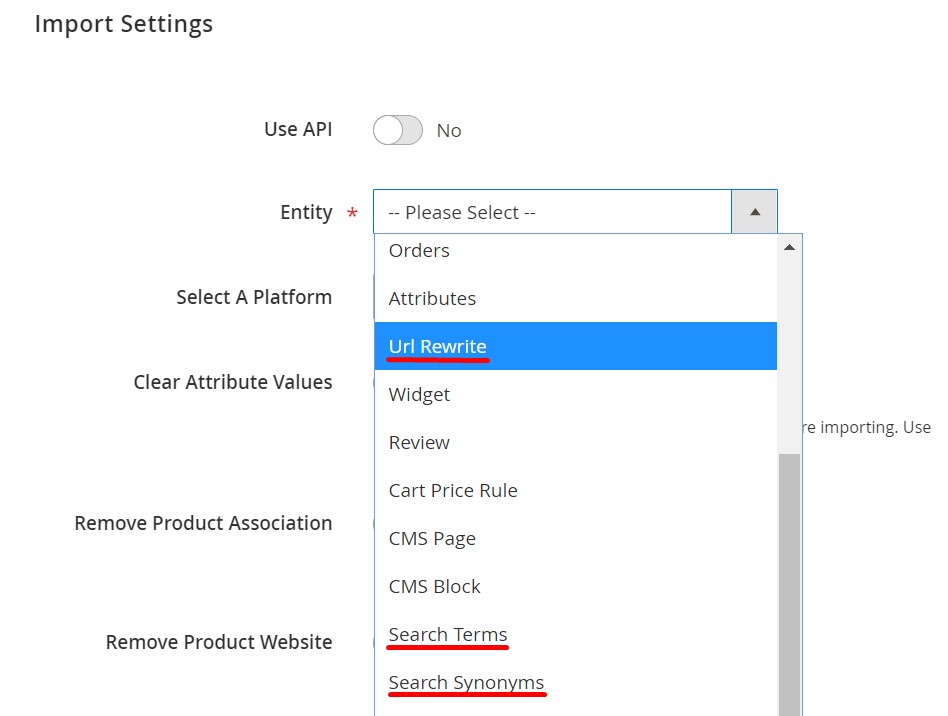
Now, you can go to the Import Behavior tab and choose how to run the update. Select Add/Update from the dropdown, choose a validation strategy, set a limit on errors, and specify separators.
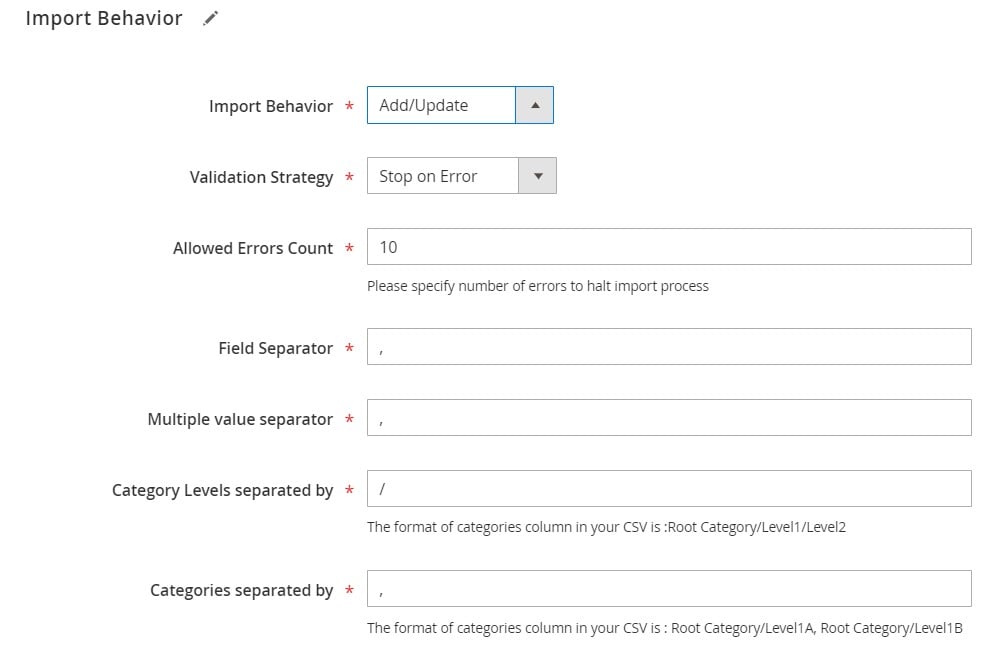
Proceed to the Import Source section and select CSV or another standard as your import file type. Next, specify your import source: a server, Dropbox account, URL, or direct upload.
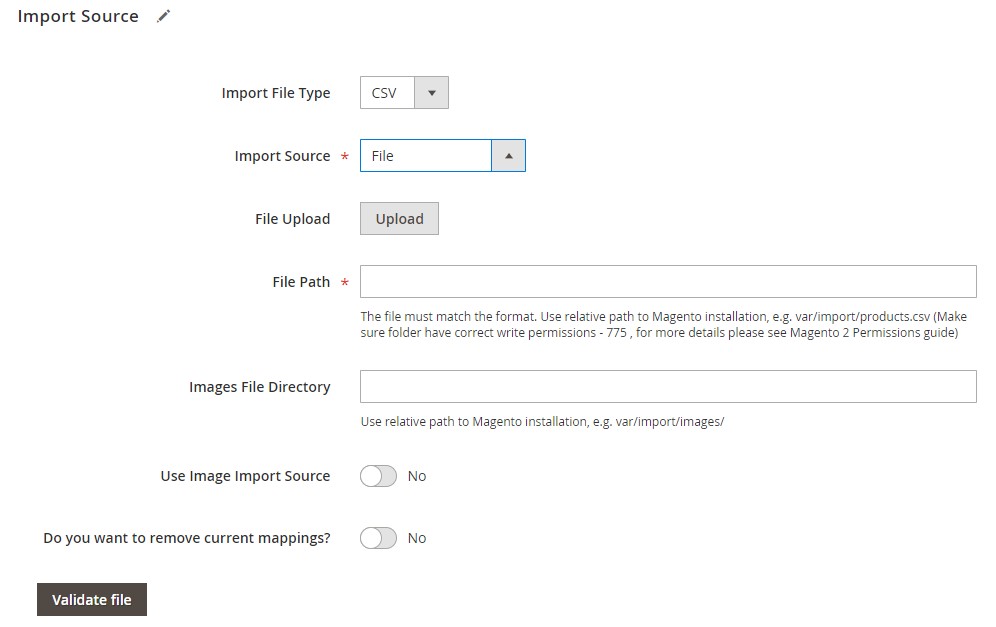
To import cart URL rewrites, search terms, or search synonyms to Magento 2, hit “Save & Run” in the top right corner of the screen. Now, our extension will transfer all the corresponding data to your new Magento 2 store. For further information, follow the link below and contact our support:
Get Improved Import & Export Magento 2 Extension
How to Export URL Rewrites, Search Terms, Search Synonyms from Magento 2
As for the export procedure, it can also be based on the Improved Import & Export Magento 2 extension. Follow these steps to achieve your goal:
Under System->Improved Import/Export->Export Jobs, create a new export job: hit the “Add New Job” button.
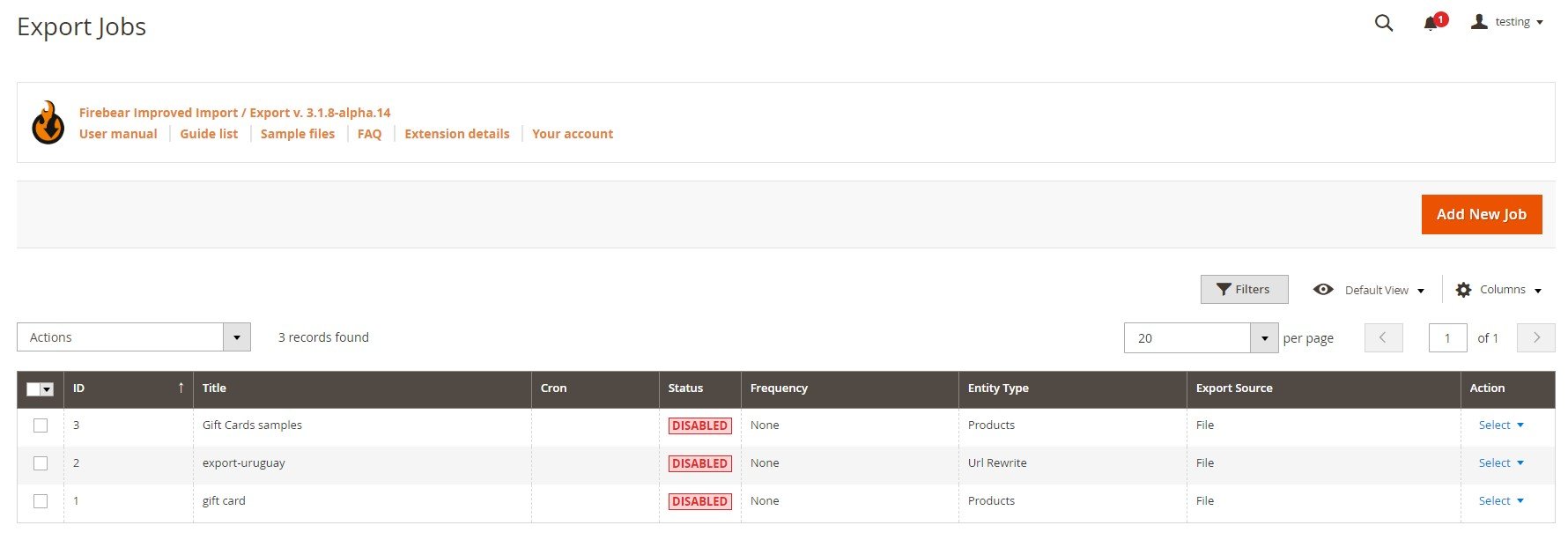
Go to the General Settings section to enable the job and specify its title. Next, select a frequency (e.g., every day at 3:00 am if you want to provide CRM with updates daily). Choose a local file language and divide additional attributes if necessary.
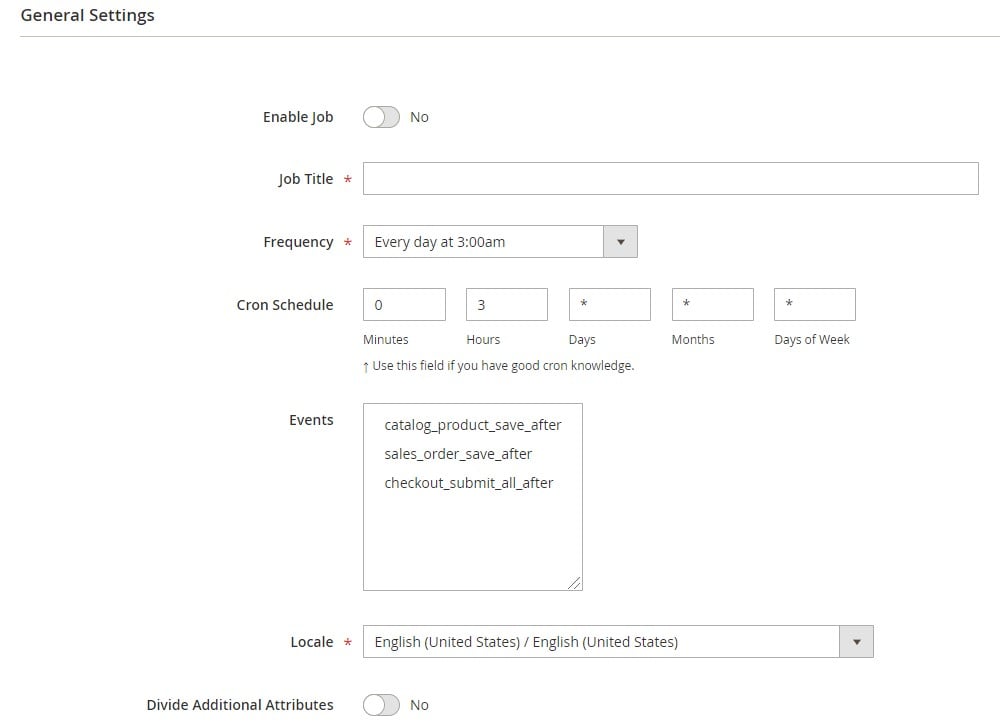
Now, you can proceed to Export Settings. Here, Improved Import & Export lets you select URL rewrites, search terms, or search synonyms as your entity. Enable Consecutive Export to transfer the required data.
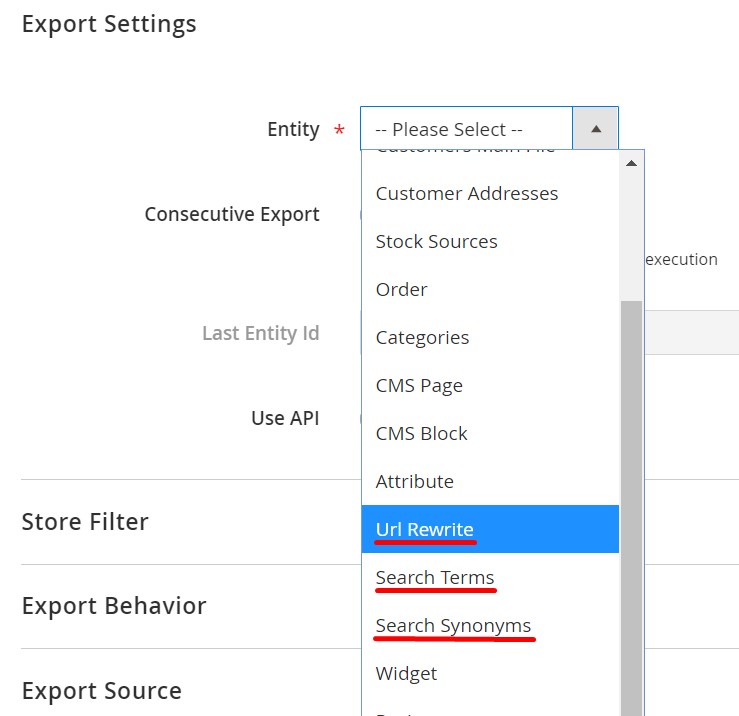
As for the Export Behavior tab, you can select a format of your export file and specify separators here.
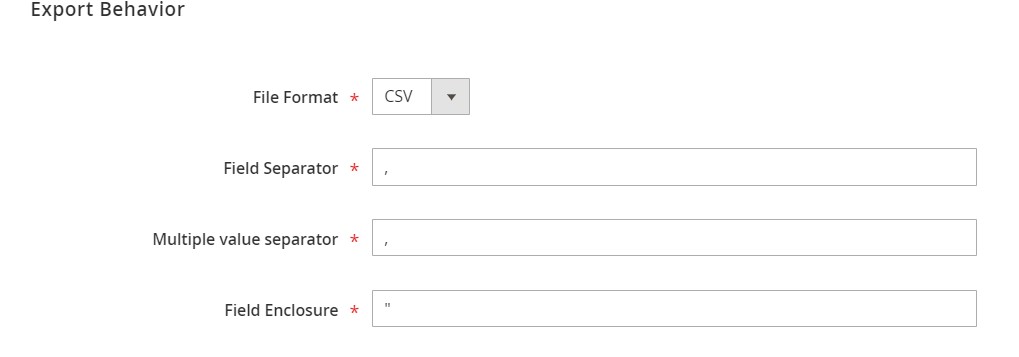
While in Export Source, choose the final destination of the data transfer. Select FTP, SFTP, or a data file and check the connection before going any further.
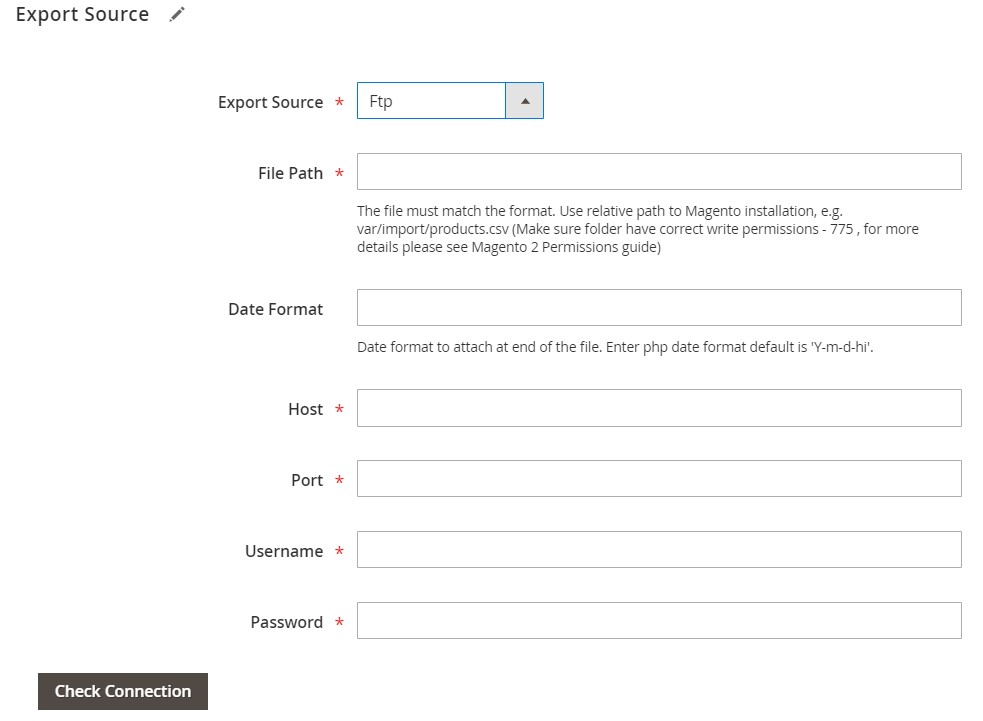
Next, the extension lets you map attributes and add filters.
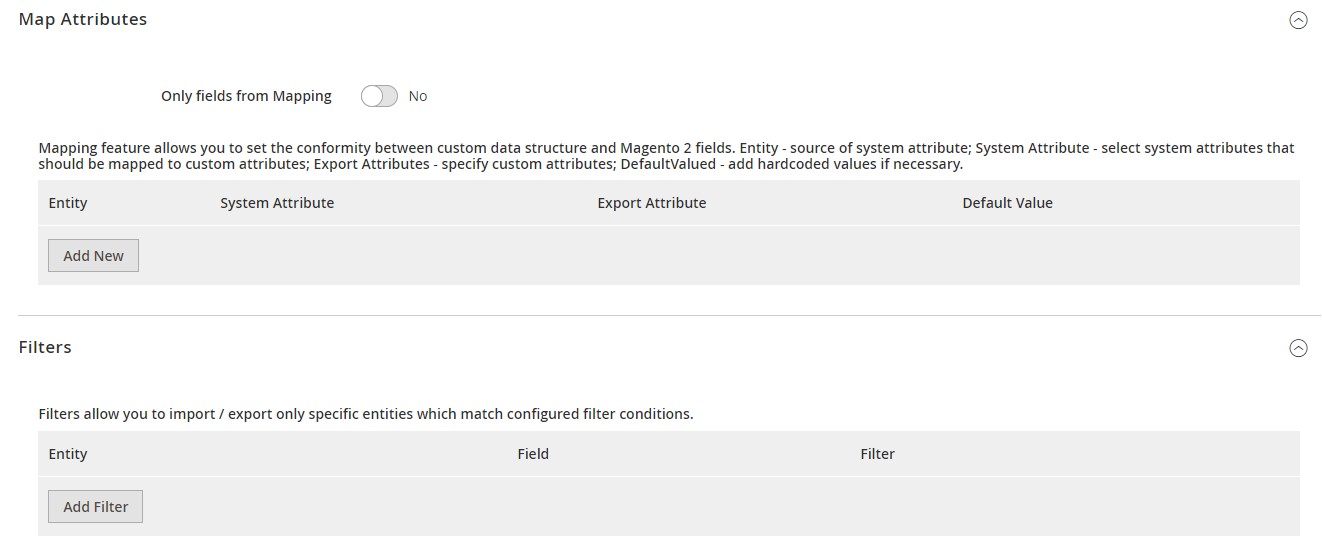
To start the export process, hit “Save & Run” in the top right corner of the screen. You can find more information regarding how to export URL rewrites, search terms, and search synonyms from Magento 2 on our website. Follow the link below and contact our support:
Get Improved Import & Export Magento 2 Extension
Improved Import & Export Features
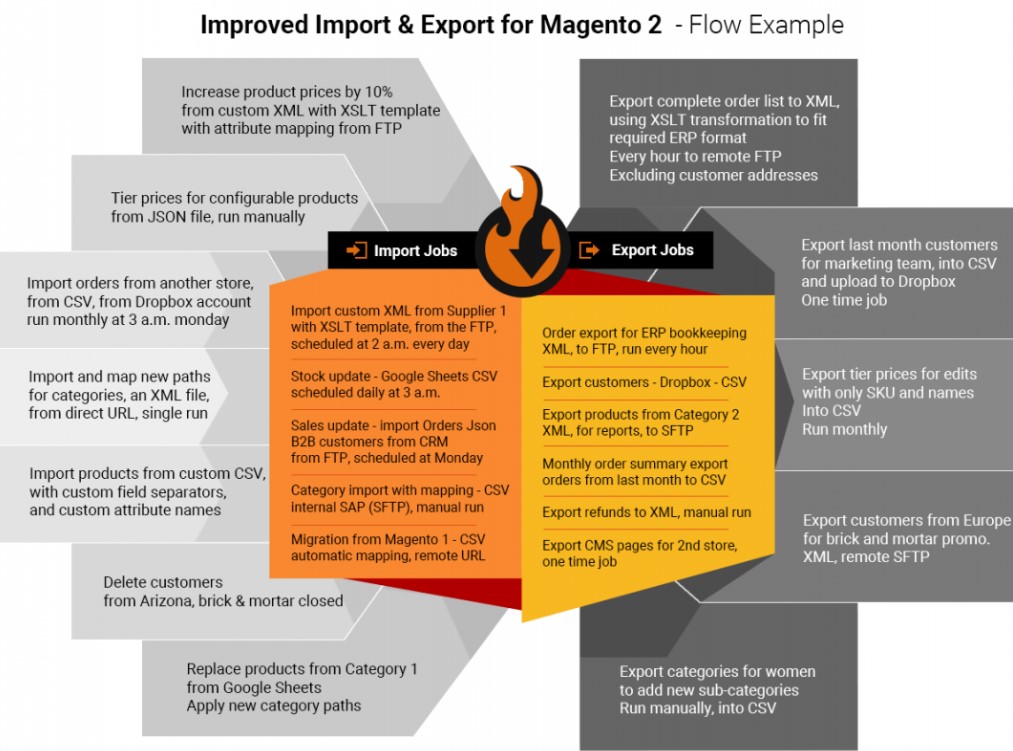
Since URL rewrites, search terms, and search synonyms are not the only entities supported by our module, let’s say a few more words about the opportunities it offers. You can use Improved Import & Export to establish any connection with external systems, transferring any data between the two platforms. The extension simplifies your daily routine related to the import and export processes of all Magento 2 entities dramatically, providing several different techniques for moving data between your e-commerce website and other platforms. You can transfer data files, use intermediary services, or establish a direct API connection between the two systems, configuring and automating all import and export processes right in the admin section.
Automated Import & Export Processes
With the Improved Import & Export Magento 2 extension, you can automate data transfers in two different ways: create schedules or configure event-based triggers. We describe both mechanisms below. Let’s take a look at schedules first.
Schedules
The Improved Import & Export Magento 2 extension uses the default cron syntax for import/export schedules. As a result, moving Magento 2 entities to/from a remote platform becomes entirely automated. You can specify any custom intervals enabling all possible schedules. At the same time, it is possible to select one of the predefined intervals – note that they are also fully customizable – as well as create import and export profiles that have no schedules. It is also necessary to mention that you can launch every profile manually.
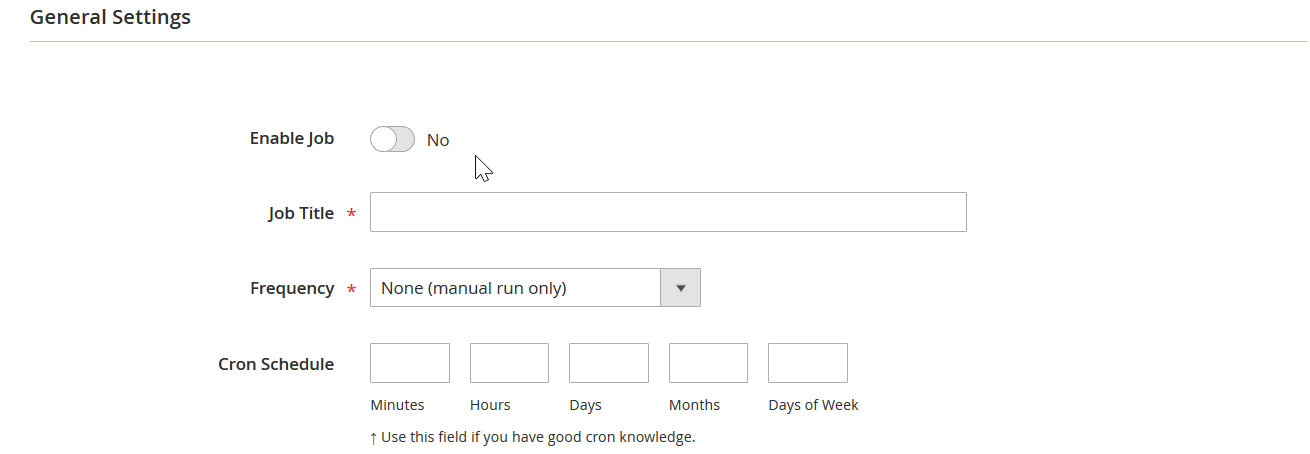
Events
Event-based triggers provide the second way of automating data transfers in Magento 2. Furthermore, they enable real-time updates. You only have to create and configure a trigger to launch import/export processes and synchronize two systems right after a specific action takes place. Everything is reduced to selecting an event that starts customer data import or export. Thus, the data is transferred to a remote platform in real-time. It is also possible to create and configure triggers for import processes. For further information, check this article: How to Run Magento 2 Import or Export After Specific System Event or Process.
Advanced Mapping Features
Unfortunately, different attribute standards cause numerous problems when it comes to the integration between the two systems. But you can avoid most of them using Improved Import & Export. Our extension eliminates the necessity to edit attributes and their values manually in a data file. You can also match categories as well as generate missing data right during the import. Every configuration is saved and applied to further updates so that you can automate import/export processes entirely.
Mapping Presets
You get a very user-friendly way of matching external attributes to ones used internally with the Improved Import & Export Magento 2 extension. The module offers predefined mapping presets developed to match third-party attributes to ones used in Magento 2 in a few clicks.
Just select a preset while configuring a new job, choosing one that suits your integration. Next, the Improved Import & Export Magento 2 extension will do all the work for you. Our tool will analyze the input data matching all third-party designations to the internal ones. Thus, we eliminate the necessity to discover third-party attributes that should be replaced. So are all manual interactions with data files. Here is how everything looks in the admin:
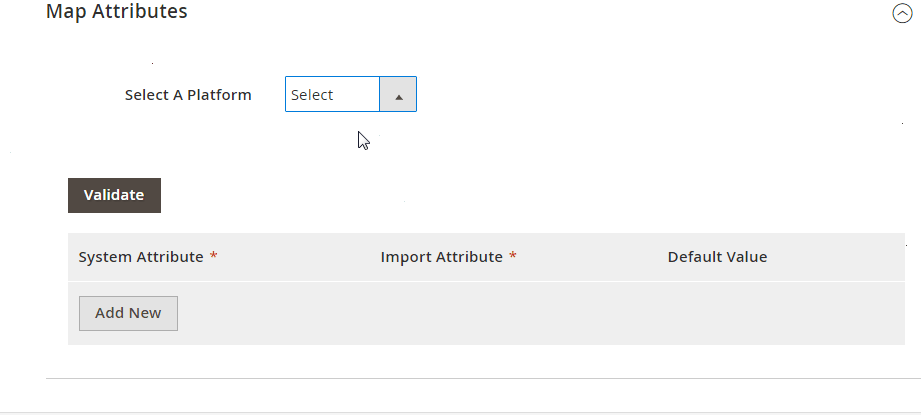
Matching Interface
If you cannot find the necessary preset, a matching interface is available in every import and export profile. Thus, you can map attributes in the Magento 2 backend manually without editing any data files. Select an entity, choose a system attribute, and specify the corresponding external one in front of it as shown below:
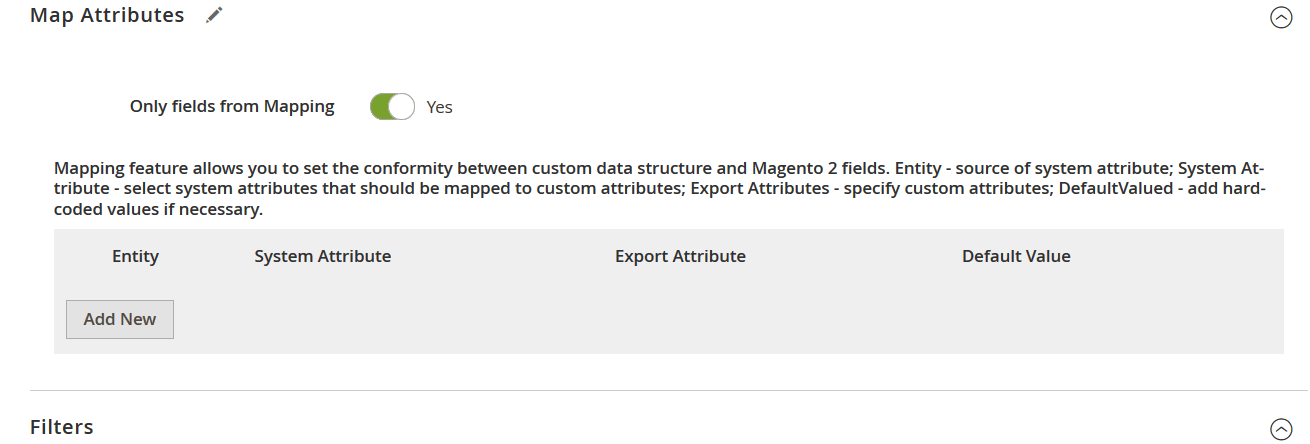
As you can see, it is possible to add hardcoded (default) attribute values in the “Default Value” column. Such values are provided to all items that us the appropriate attribute.
Filters
If you need to provide an external system with particular data, filters are under your disposal. They narrow down the selection of items in a file so that you can reduce it to elements required by a third-party platform. Follow these steps to master the tool:
- Click the ‘Add Filter’ button;
- Select an entity;
- Select a system attribute that will be used as a basis of a new filter;
- Specify parameters applied for filtering;
- Repeat the previous steps to create more filters.
Although filter parameters differ depending on the selected attributes, everything is intuitive and straightforward:

Attribute Values Mapping
Map attribute values using the Improved Import & Export Magento 2 extension, simplifying your import/export routine dramatically since no incorrect designations prevent import processes. You can match them via an interface similar to the one we’ve just described above. Just choose a third-party designation and specify a corresponding internal one in front of it while importing customers to Magento 2 to avoid problems caused by third-party attribute values. Repeat the process until no external designations are left. For further information, read this article: Attribute Values Mapping.
Attribute Values Editing
The ability to edit attribute values in bulk is another handy feature introduced in our module. The Improved Import & Export Magento 2 extension lets you use the following rules:
- Add a prefix to multiple attribute values;
- Add a suffix to numerous attribute values;
- Split various attribute values;
- Merge multiple attribute values.
The module lets you combine them and apply them to multiple values simultaneously. The plugin also introduces an opportunity to create various conditions to increase the efficiency of editing. For further information, check this article: How to Modify Attribute Values During Import and Export in Magento 2.
Category Mapping
If you have to deal with product import, our extension also comes in handy. It not only lets you transfer thousands of items but also helps to modify data from external catalogs via category mapping.
You no longer have to edit third-party categories or apply changes to the transferred products manually. Our module lets you match external product categories to ones used internally right in your admin. The process looks as follows:
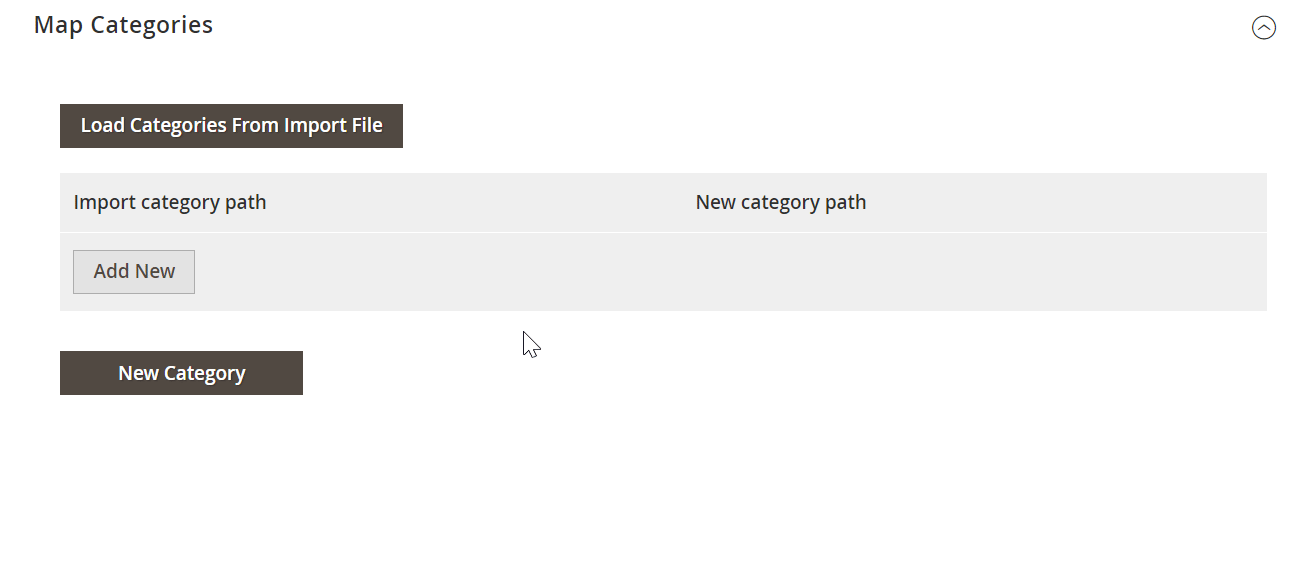
It is also possible to create new categories on the fly. The Improved Import & Export Magento 2 module lets you select a parent category and specify a new one related to it. Both features are described here: Category Mapping.
Attributes On The Fly
The ability to create attributes on the fly is another cool improvement introduced in our module. This feature lets you add missing data when you transfer a file to your website. The Improved Import & Export extension offers the following general form to specify parameters necessary to get all missing attributes automatically:
Attribute|attribute_property_name:attribute_property_value|…
The procedure is described in more detail here: Product attributes import.
Extended Connectivity Options
The Improved Import & Export Magento 2 extension also offers several extended connectivity options. We briefly describe them below.
Multiple File Standards
Unfortunately, CSV is the only standard Magento supports, but you can avoid this limitation with our tool. It introduces a bunch of new options that are not available on the platform by default. In addition to the default format, the module lets you use XML, JSON, ODS, and Excel. Thus, the necessity to convert everything into CSV and vice versa is eliminated! And if data files are compressed, the Improved Import & Export Magento 2 extension will extract them automatically.
Multiple File Sources
Support for multiple sources is another feature that simplified your daily routine. The Improved Import & Export extension lets you leverage the following connection options to transfer data file:
- FTP/SFTP. Transfer data files using a local or remote server.
- Dropbox. Use a Dropbox account to establish a connection between the two systems. Alternatively, you can rely on Box, OneDrive, Google Drive, iCloud, and Amazon Drive.
- URL. A direct URL can be used to import a data file as well.
Alternative Ways of Import & Export
Furthermore, the Improved Import & Export extension exceeds the default functionality of the platform much further. It introduces two exclusive ways of import and export that are not represented in Magento 2 by default.
First of all, you can use direct API connections to transfer data between your e-commerce website and third-party systems. It provides the ability to leverage REST, SOAP, and GraphQL. Note that all API connections support other extension’s features.
Intermediary services are the second alternative way of transferring data. Our module works with Google Sheets, Office 365 Excel, and Zoho Sheet. Use them to transfer any data to Magento 2. The following image illustrates how to import products from Google Sheets:
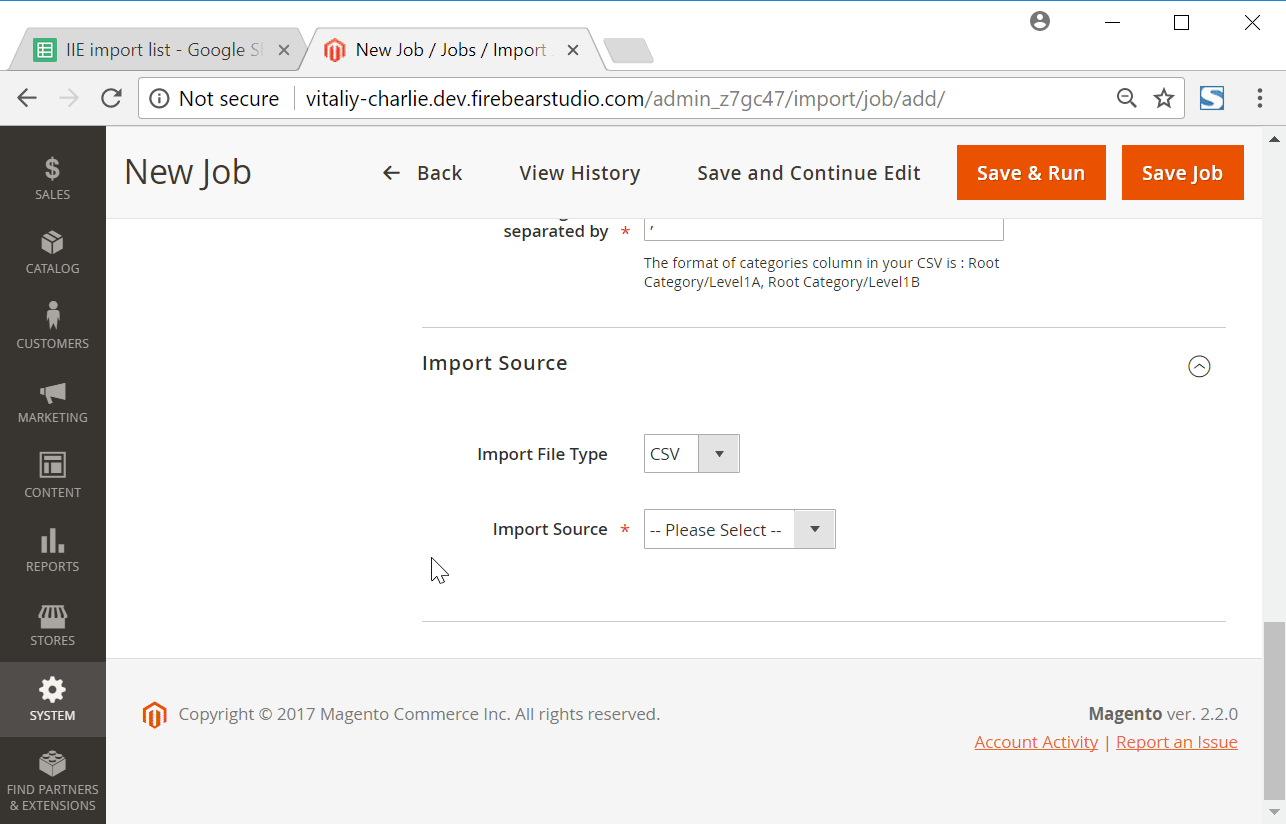
And of course, the Improved Import & Export extension opens completely new possibilities with support for WSDL and WADL.
The video below displays other details of our extension:
Final Words
Now, you know how to create and edit URL rewrites, search terms, and search synonyms in Magento 2. As for the corresponding data transfers, they become dramatically simplified if you use the Improved Import & Export module. For further possibilities of our extension, follow the link below and contact our support:
Get Improved Import & Export Magento 2 Extension

